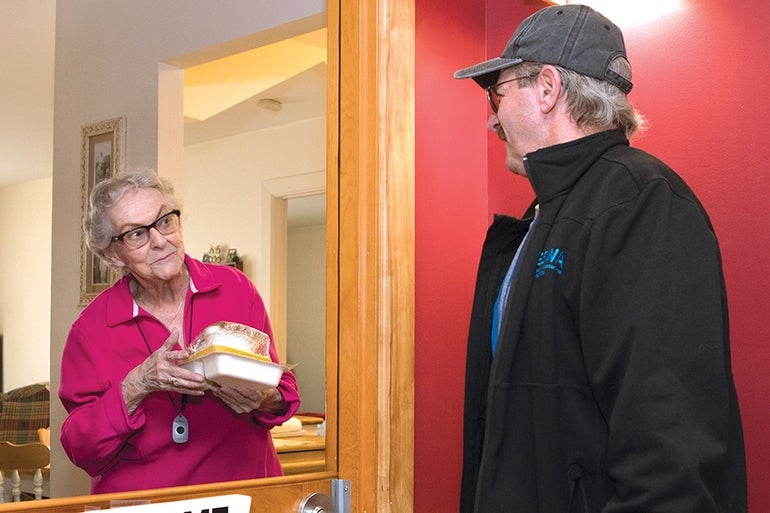Professionals working to fight health effects of loneliness among seniors
 Photo/Matt Wright
Worcester area resident Evelyn McTiude greets Meals on Wheels delivery man Paul Frigon at her home.
Photo/Matt Wright
Worcester area resident Evelyn McTiude greets Meals on Wheels delivery man Paul Frigon at her home.
When Marie retired more than two decades ago, she decided to spend her days volunteering. But then she got sick and wasn’t able to continue, which was frustrating.
“I’m a people person,” she said. “I needed something to do besides sit there and feel bad for myself and look at four walls.”
So, she started doing an osteoporosis exercise program at the Worcester Senior Center. Today at age 87, Marie, who asked that her last name not be used to preserve her privacy, is still a regular at the center. She plays card games, enjoys meals she doesn’t have to shop for and prepare herself, and spends time with friends, including some people she met at that first exercise class two decades ago.
“In order to keep your sanity you’ve got to be out moving and participating in things and talking to people,” she said. “I’m not interested in TV, and I don’t have a computer because I don’t want to get involved in it.”
There’s strong evidence taking the steps Marie has – and having access to the resources she’s found at the senior center – can make a huge difference when it comes to the mental and physical health of older people. Lack of social connection carries risks comparable to obesity, physical inactivity, air pollution, or smoking up to 15 cigarettes a day, according to published work by psychology and neuroscience researcher Julianne Holt-Lunstad. Loneliness is a particular problem among older adults, who often live alone and are typically retired, and Holt-Lunstad found it can contribute to depression, cognitive decline, dementia, high blood pressure, inflammation, and immune system problems.
Interacting with other people
Dr. Leah Richler, a psychiatrist at the UMass Memorial Health Care System in Worcester, has been working with people over 65 in Central Massachusetts for over a decade, and she said loneliness is a real problem in this region.
“It is definitely a struggle and definitely impacts the health of aging individuals,” Richler said.
Richler described one patient who had been struggling with anxiety, depression, and pulmonary disease after her husband died. With Richler’s support, she moved to an assisted living facility where she had more company and support.
“Within maybe even a month, month and a half, her breathing had significantly improved, her anxiety was improved, she was feeling safe, feeling comfortable,” Richler said.
In another case, a man sought help after retiring from a demanding job.
“He worked in business, and he retired; and after his retirement his wife told him he had to go see a psychiatrist,” Richler said. “He started volunteering at various institutions in the area and found that he just felt so much better because he was getting out of the house and interacting with other people.”
Getting people through the door
Beyond the mental health support medical professionals like her can offer, Richler said, larger institutional changes are needed to reduce loneliness overall. And much of that comes from community institutions like the senior center where Marie spends her time.
Amy Waters, the Worcester Senior Center’s director, said her organization takes the issue of isolation and loneliness seriously. Beyond offering a wide range of activities, from tai chi to billiards to art shows and concerts, the center offers workshops on staying active, planning for all aspects of retirement, and volunteer opportunities. It organizes events for people with dementia, as well as a respite program for family caregivers, who are high risk for social disconnection.
“We have a weekly period where they can drop off their person with dementia, and we give them special supervision and special activities so the caregiver can get out and maybe see a friend they haven’t seen for a year,” Waters said.
Joan Goodwin, executive director of the Fitchburg Senior Center, said isolation and depression can become a vicious cycle for older people. Just as loneliness can lead to depression, being depressed can make it hard to seek social connections.
“I have seen situations personally with people that depression is the first thing, and it just pulls you into that isolation,” she said.
The Fitchburg Senior Center serves a range of people, including low-income seniors, some who are homeless. Isolation can be especially difficult for people with limited financial resources. Goodwin said the center sometimes offers free groceries like meat, bread, and pastries. She uses that as an opportunity to sit down with the people who come in, see what they may need, and explain the activities and services the center offers.
Of course, not all older adults can, or want to, take part in group activities. Maureen Siergie, executive director of Elder Services of Worcester Area, a nonprofit agency providing services to older adults at home, said it’s crucial to consider each individual’s needs and desires.
“There might be one person in an apartment who would really like the opportunity to get out and enjoy the activities of the senior center, and there might be someone in the apartment next door who really never joined in social activities, and their needs are different,” Siergie said. “We go with what’s important to each individual, and not necessarily go in and prescribe what we think is necessary.”
Elder Services workers do clients’ laundry, deliver Meals on Wheels, and provide other services to help them maintain a high quality of life while living independently.
Diverse populations, diverse needs
For all organizations serving older adults, it’s important to consider the needs of diverse populations. For example, Siergie said, her agency works hard to make its home services friendly to LGBTQ elders.
“When you think about somebody who’s now 65, 70 years old and is gay, they may have gone through periods of their lives where that needed to be hidden,” she said. “If somebody’s going to come in and assist you with bathing or laundry, we need people to be aware that we’re welcoming and we never are going to judge. It’s safe for them to be who they are when we’re there.”
Similarly, Siergie, Waters, and Goodwin said they work to ensure their services are accessible for people who speak many different languages and come from a variety of cultural backgrounds.
Regardless of specific circumstances, Siergie said, it’s important for older adults and their families to know there are resources and services available across Central Massachusetts to help people continue living their best lives. The most difficult part for some may be taking the first step to connect with them.
“We want to hear from people, so whether it’s from a family member, from an elder themselves, from a physician’s office,” she said. “We can help not only to figure out if our services are the right options but explore other resources in the community.”









0 Comments